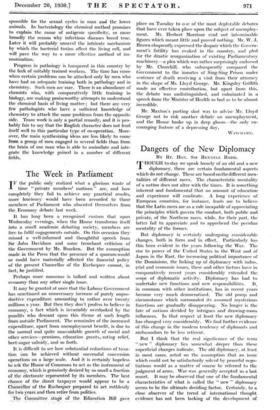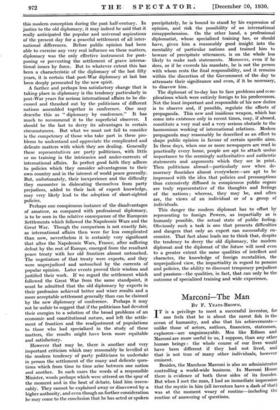Dangers of the New Diplomacy
BY RT. HON. SIII RENNELL ROOD.
THOUGH to-day we speak loosely of an old and a new diplomacy, there are certain fundamental aspects which do not change. These are based on the different men- talities of different races. The characteristic mentality of a nation does not alter with the times. It is something inherent and fundamental that no amount of education and experience will eradicate. A long experience of European countries, for instance, leads me to believe that the Latin races are as a rule incapable of appreciating the principles which govern the conduct, both public and private, of the Northern races, while, for their part, the latter fail to appreciate and to apprehend the • peculiar mentality of the former.
But diplothacy is certainly undergoing considerable changes, both in form and in effect. Particularly has this been evident in the years following the War. The rise to power of the United States in the West and of Japan in the East, the increasing political importance of the Dominions, the linking up of diplomacy with Indus_ trial and economic issues, these and other factors have in comparatively recent years considerably extended the scope of diplomatic activity. Diplomacy has had to undertake new functions and new responsibilities. It in common with other institutions, has in recent years become very much democratized. The old pomp and circumstance which surrounded its assumed mysterious functions are gradually disappearing. No longer is the fate of nations decided by intrigues and drawing-room influences. In that respect at least the new diplomacY has changed very considerably. We find further evidence of this change in the modern tendency of diplomats and ambassadors to be less reticent.
But I think that the real significance of the term " new " diplomacy lies somewhat deeper than these superficial changes indicate. The old diplomacy, at least in most cases, acted on the assumption that an issue which could not be satisfactorily solved by peaceful nego- tiations would as a matter of course be referred to the judgment of arms. War was generally accepted as a last resort. It may be observed that one of the fundamental characteristics of what is called the " new " diplomacy seems to be the ultimate deciding faetor. Certainly, to a cloie observer of the trend of international thought evidence has not been lacking of the development of this modern conception during the past half-century. In justice to the old diplomacy, it may indeed be said that it really anticipated the popular and universal aspirations of the present day for a peaceful settlement of all inter- national differences. Before public opinion had been able to exercise any very real influence on these matters, diplomacy was the only effective instrument for post- poning or preventing the settlement of grave interna- tional issues by force. But to whatever extent this has been a characteristic of the diplomacy of the last fifty years, it is certain that post-War diplomacy at last has been deeply permeated by the new spirit.
A further and perhaps less satisfactory change that is taking place in diplomacy is the tendency particularly in post-War years for serious international affairs to be dis- cussed and thrashed out by the politicians of different nations assembled together in conference. One may describe this as " diplomacy by conference." It has much to recommend it to the superficial observer. I should be the last to decry its advantages in certain circumstances. But what we must not fail to consider is the competency of those who take part in these pro- blems to understand and appreciate the complicated and delicate matters with which they are dealing. Generally these representatives are party politicians, with little or no training in the intricacies and under-currents of international affairs. In perfect good faith they adhere .to policies which they consider advantageous to their own country and in the interest of world peace generally. But, unfortunately, their inexperience and the difficulty they encounter in dislocating themselves from party prejudices, added to their lack of expert knowledge, may very likely lead to the adoption of short-sighted policies.
Perhaps one conspicuous instance of the disadvantages of amateur, as compared with professional diplomacy, is to be seen in the relative consequence of the European Settlements which followed the Napoleonic Wars and the Great War. Though the comparison is not exactly fair, as international affairs then were far less complicated than now, nevertheless it is certainly very significant that after the Napoleonic Wars, France, after suffering defeat by the rest of Europe, emerged from the resultant peace treaty with her old frontiers almost untouched. The negotiators of that treaty were experts, and they were unprejudiced and untouched by the currents of popular opinion. Later events proved their wisdom and justified their work. If we regard the settlement which followed the Great War from the same standpoint, it must be admitted that the old diplomacy by experts in their profession achieved better and wiser results and a more acceptable settlement generally than can be claimed by the new diplomacy of conference. Perhaps it may not be unfair to suggest that if the politicians had devoted their energies to a solution of the broad problems of an economic and constitutional nature, and left the settle- ment of frontiers and the readjustment of populations to those who had specialized in the study of these matters, the results might have been more equitable and satisfactory.
However that may be, there is another and very important criticism which may reasonably be levelled at the modern tendency of party politicians to undertake in person the settlement of the many and delicate ques- tions which from time to time arise between one nation and another. In such cases the words of a responsible Minister, words perhaps which were uttered on the spur of the moment and in the heat of debate, bind him irrevo- cably. They cannot be explained away or disavowed by a higher authority. and even though on further consideration he may come to the conclusion that he has acted or spoken
precipitately, he is bound to stand by his expression of opinion, and risk the possibility of an international misapprehension. On the other hand, a professional diplomatist, whose specialized training has, or should have, given him a reasonably good insight into the mentality of particular nations and trained him to beware of precipitate utterances, is on the whole less likely to make rash statements. Moreover, even if he does, or if he exceeds his mandate, he is not the person with whom rests the final responsibility, and it remains within the discretion of the Government of the day to attenuate their significance and even, if it be necessary, to disavow him.
The diplomat of to-day has to face problems and com- plications which were entirely foreign to his predecessors. Not the least important and responsible of his new duties is to observe and, if possible, regulate the effects of propaganda. This new and insidious weapon, which has come into existence only in recent times, may, if abused, constitute a very real and a very serious obstacle to the harmonious working of international relations. Modern propaganda may reasonably be described as an effort to shape public opinion in favour of certain specific aims. In these days, when one or more newspapers are read in practically every home, people are apt to attach undue importance to the seemingly authoritative and authentic statements and arguments which they see in print. Then politicians abroad—particularly now when de- mocracy flourishes alMost everywhere—are apt to be impressed with the idea that policies and presumptions thus extensively diffused in conspicuous public organs are truly representative of the thoughts and feelings of the nations ; whereas, they may be, and often are, the views of an individual or of a group of individuals.
This danger the modern diplomat has to offset by representing to foreign Powers, as impartially as is humanly possible, the actual state of public feeling. Obviously such a task is one that presents difficulties and dangers that only an expert can successfully en- counter. That fact alone leads me to think that, despite the tendency to decry the old diplomacy, the modem diplomat and the diplomat of the future will need even to a greater extent the same qualities of intellect and character, the knowledge of foreign mentalities, the unprejudiced view, the impartiality in regard to persons and policies, the ability to discount temporary prejudices and passions—the qualities, in fact, that can only be the outcome of specialized training and wide experience.







































 Previous page
Previous page